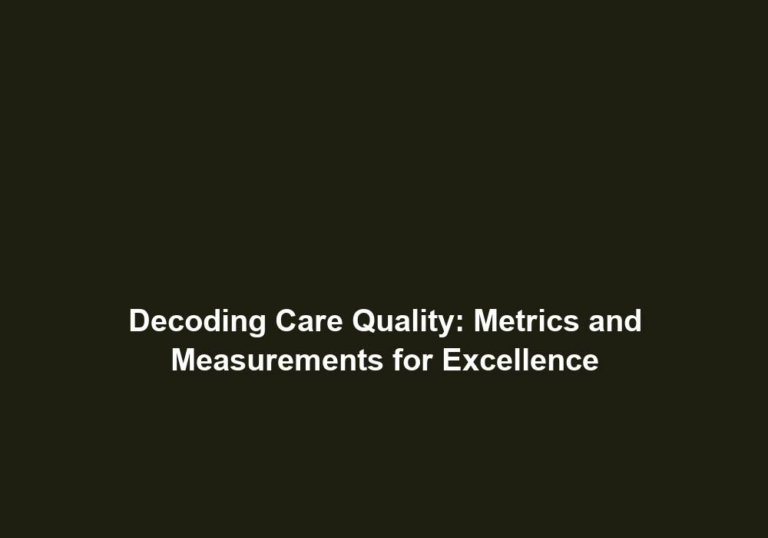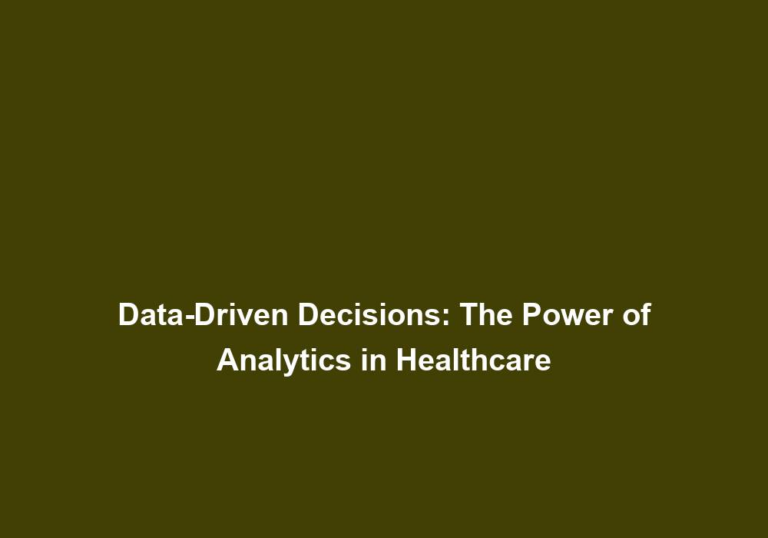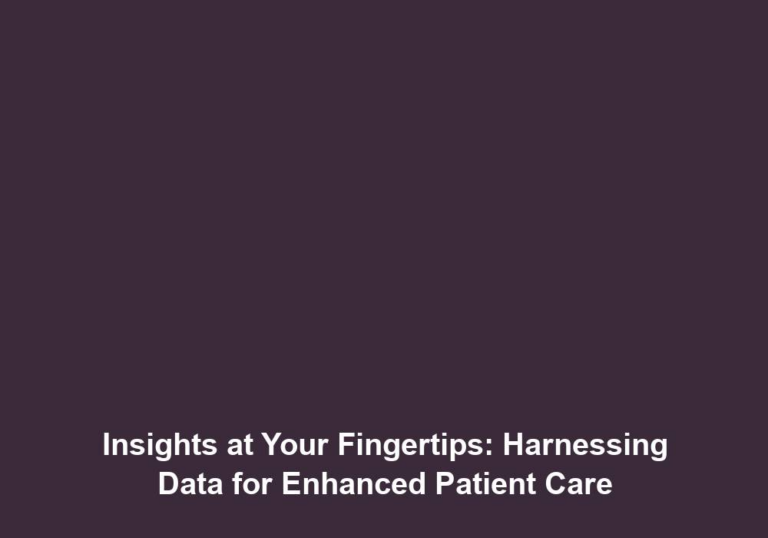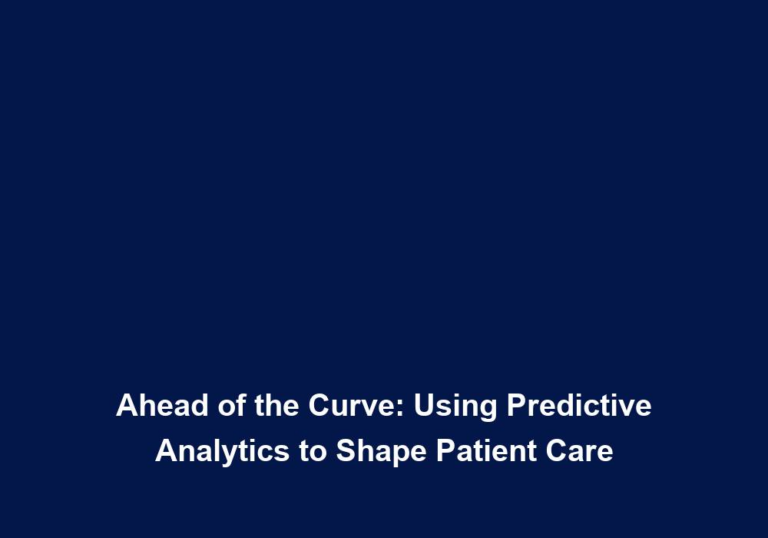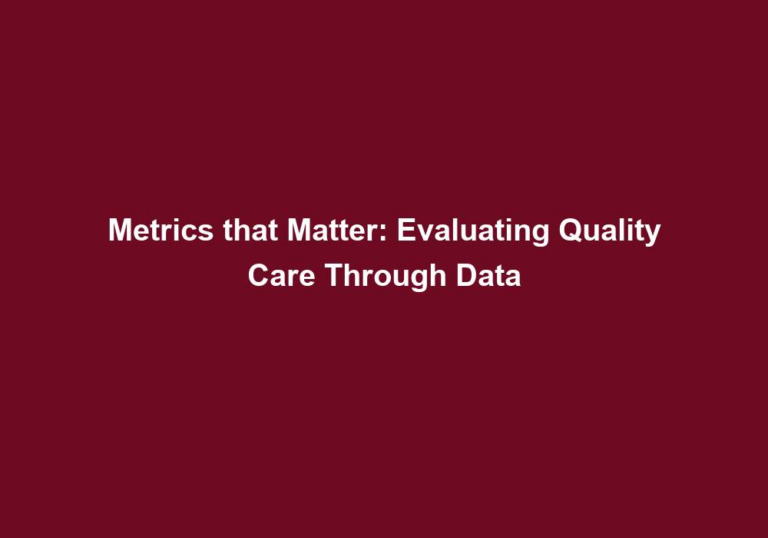Future-Ready Healthcare: Leveraging Predictive Analytics for Better Outcomes
In the rapidly evolving landscape of healthcare, staying ahead of the curve is crucial for delivering better outcomes and improving patient care. One of the most promising advancements in recent years is the use of predictive analytics in healthcare. By harnessing the power of big data and sophisticated algorithms, healthcare providers can now predict and prevent diseases, enhance treatment plans, optimize resource allocation, and improve overall efficiency. In this article, we will explore how predictive analytics is reshaping the future of healthcare and its potential to revolutionize patient care.
Understanding Predictive Analytics in Healthcare
Predictive analytics involves the utilization of historical data, statistical algorithms, and machine learning techniques to forecast future events or behaviors. In the context of healthcare, it refers to the use of these tools to analyze vast amounts of patient data and identify patterns or trends that can help predict health outcomes. By mining electronic health records, medical claims data, genomic data, and even social media data, healthcare organizations can gain valuable insights into patient risks, treatment response rates, and disease progression.
Predictive analytics in healthcare has the potential to transform the way healthcare providers deliver care. By leveraging historical data and advanced analytical tools, healthcare professionals can make informed decisions and implement preventive measures to improve patient outcomes. These tools enable healthcare organizations to identify patterns and trends in patient data, allowing for a more proactive approach to healthcare.
The Benefits of Predictive Analytics in Healthcare
- Early Disease Detection and Prevention: Predictive analytics allows healthcare providers to identify individuals at high risk of developing certain diseases. By analyzing patient data and using predictive models, healthcare professionals can intervene early, implement preventive measures, and potentially reduce the burden of chronic illnesses.
Predictive analytics plays a crucial role in detecting and preventing diseases at an early stage. By analyzing patient data, healthcare providers can identify individuals who are at high risk of developing certain diseases. This allows for targeted interventions and the implementation of preventive measures, such as lifestyle changes or medication, to reduce the likelihood of disease progression. Early detection and prevention can significantly improve patient outcomes and reduce healthcare costs.
- Personalized Treatment Plans: By analyzing historical patient data, predictive analytics can help healthcare providers tailor treatment plans to individual needs. Predictive models can identify the most effective interventions for specific patient profiles, leading to better treatment outcomes and improved patient satisfaction.
Predictive analytics enables healthcare providers to personalize treatment plans based on individual patient characteristics. By analyzing historical patient data, healthcare professionals can identify patterns and trends that indicate the most effective interventions for specific patient profiles. This allows for a more targeted and personalized approach to treatment, leading to better patient outcomes and increased patient satisfaction.
- Optimized Resource Allocation: Predictive analytics enables healthcare organizations to predict patient volumes, optimize bed utilization, and allocate resources efficiently. By accurately forecasting patient demand, healthcare providers can reduce wait times, streamline workflows, and ensure timely access to care.
Predictive analytics plays a crucial role in optimizing resource allocation in healthcare organizations. By analyzing historical patient data and predicting patient volumes, healthcare providers can optimize bed utilization and allocate resources efficiently. This leads to reduced wait times, streamlined workflows, and improved access to care for patients.
- Enhanced Operational Efficiency: Predictive analytics can assist healthcare organizations in identifying operational inefficiencies and implementing process improvements. By analyzing data related to patient flow, staffing levels, and resource utilization, healthcare providers can streamline operations, minimize bottlenecks, and improve overall efficiency.
Predictive analytics helps healthcare organizations improve operational efficiency by identifying areas of improvement and implementing process changes. By analyzing data related to patient flow, staffing levels, and resource utilization, healthcare providers can identify bottlenecks and inefficiencies in their operations. This allows for targeted process improvements, leading to enhanced operational efficiency and improved patient care.
- Improved Patient Safety: Predictive analytics can contribute to enhancing patient safety by identifying potential adverse events before they occur. By analyzing patient data and patterns, healthcare providers can implement proactive measures to prevent medication errors, infections, and other adverse events, ultimately saving lives and reducing healthcare costs.
Predictive analytics plays a vital role in improving patient safety by identifying potential adverse events before they happen. By analyzing patient data and patterns, healthcare providers can identify early warning signs of potential adverse events, such as medication errors or infections. This allows for proactive measures to be implemented, reducing the risk of harm to patients and improving overall patient safety.
The Challenges of Implementing Predictive Analytics in Healthcare
While the potential benefits of predictive analytics in healthcare are substantial, there are several challenges that need to be addressed for successful implementation:
- Data Quality and Integration: Healthcare organizations often struggle with data quality issues and fragmented systems. To leverage predictive analytics effectively, it is essential to ensure the accuracy, completeness, and interoperability of diverse healthcare data sources.
One of the challenges in implementing predictive analytics in healthcare is ensuring the quality and integration of data. Healthcare organizations often face issues with data quality, such as incomplete or inaccurate data, and fragmented systems that make it difficult to integrate data from different sources. Addressing these challenges is crucial to ensure the effectiveness of predictive analytics in healthcare.
- Privacy and Security Concerns: Patient data privacy and security are paramount in healthcare. Predictive analytics requires access to sensitive patient information, making it crucial to have robust data protection measures in place to maintain patient confidentiality and comply with privacy regulations.
Another challenge in implementing predictive analytics in healthcare is ensuring patient data privacy and security. Predictive analytics requires access to sensitive patient information, which raises concerns about patient confidentiality and compliance with privacy regulations. Healthcare organizations must have robust data protection measures in place to safeguard patient data and ensure compliance with privacy regulations.
- Organizational Culture and Change Management: Implementing predictive analytics requires a cultural shift within healthcare organizations. It is essential to foster a data-driven mindset, train staff in data analysis, and establish a collaborative environment that supports the integration of predictive analytics into clinical workflows.
Implementing predictive analytics in healthcare requires a cultural shift within organizations. Healthcare providers need to foster a data-driven mindset and create a culture that values data analysis and evidence-based decision-making. Training staff in data analysis techniques and establishing a collaborative environment that supports the integration of predictive analytics into clinical workflows is crucial for successful implementation.
- Ethical Considerations: The use of predictive analytics raises ethical questions regarding patient autonomy, fair allocation of resources, and potential biases in decision-making algorithms. Healthcare organizations must establish clear ethical frameworks to guide the responsible use of predictive analytics tools.
The use of predictive analytics in healthcare raises ethical considerations that need to be addressed. These considerations include patient autonomy, fair allocation of resources, and potential biases in decision-making algorithms. Healthcare organizations must establish clear ethical frameworks that guide the responsible use of predictive analytics tools, ensuring that patient rights are protected and decisions are made in a fair and unbiased manner.
Future Trends in Predictive Analytics for Healthcare
The field of predictive analytics in healthcare is constantly evolving, and several exciting trends are shaping its future:
- Real-Time Predictive Analytics: The ability to predict health outcomes in real-time is becoming increasingly important. By utilizing the power of artificial intelligence and machine learning algorithms, healthcare providers can analyze live patient data and generate instant predictions, enabling timely interventions and personalized care.
Real-time predictive analytics is an emerging trend in healthcare. With advancements in artificial intelligence and machine learning algorithms, healthcare providers can analyze live patient data and generate instant predictions. This enables timely interventions and personalized care, as healthcare professionals can make informed decisions based on real-time data.
- Genomic Predictive Analytics: With advancements in genomics, predictive analytics is being used to identify genetic markers that contribute to disease risk and treatment response. By integrating genomic data with clinical data, healthcare providers can develop personalized treatment plans based on an individual’s genetic profile.
Genomic predictive analytics is an exciting trend in healthcare. With advancements in genomics, healthcare providers can use predictive analytics to identify genetic markers that contribute to disease risk and treatment response. By integrating genomic data with clinical data, healthcare professionals can develop personalized treatment plans based on an individual’s genetic profile, leading to more targeted and effective treatments.
- Predictive Analytics for Population Health Management: Predictive analytics can help healthcare organizations identify population health trends and risk factors. By analyzing community health data, healthcare providers can prioritize public health interventions and allocate resources to prevent the spread of diseases and improve community well-being.
Predictive analytics for population health management is a valuable trend in healthcare. By analyzing community health data, healthcare organizations can identify population health trends and risk factors. This enables healthcare providers to prioritize public health interventions and allocate resources effectively, leading to improved community well-being and disease prevention.
- Predictive Analytics for Precision Medicine: Precision medicine aims to deliver personalized treatments based on an individual’s unique characteristics. Predictive analytics plays a crucial role in identifying the most effective treatment options based on patient-specific factors such as genetics, lifestyle, and environmental influences.
Predictive analytics for precision medicine is a significant trend in healthcare. Precision medicine aims to deliver personalized treatments based on an individual’s unique characteristics. Predictive analytics plays a crucial role in identifying the most effective treatment options based on patient-specific factors such as genetics, lifestyle, and environmental influences. This enables healthcare providers to deliver targeted and personalized treatments, leading to improved patient outcomes.
In conclusion, predictive analytics has the potential to transform healthcare by improving patient outcomes, optimizing resource allocation, and enhancing operational efficiency. By leveraging big data and advanced analytical tools, healthcare providers can make informed decisions, implement preventive measures, and deliver personalized care. However, successful implementation requires overcoming challenges related to data quality, privacy, change management, and ethics. As the field continues to evolve, future trends in predictive analytics hold great promise for revolutionizing patient care and shaping the future of healthcare delivery.


